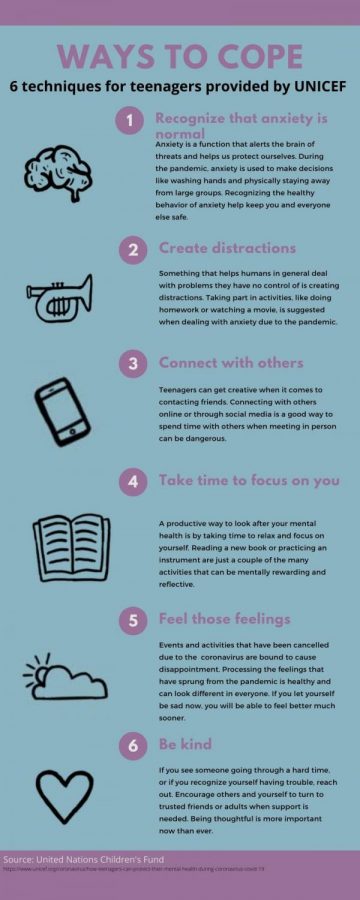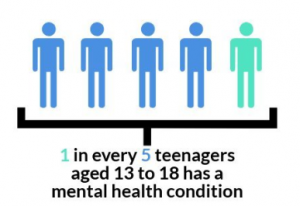Mental health challenged during coronavirus
Six ways to cope with stress and anxiety caused by the coronavirus pandemic
October 24, 2020
With virtual learning, students can experience higher levels of loneliness and anxiety. According to the American Youth Policy Forum, seclusion during quarantine can negatively impact the mental health of teens and young adults due to the lack of face-to-face interaction with others.
“I have definitely felt sadder and more anxious since quarantine started,” freshman Rory Ketzel said. “I have been trying to accept everything. I am very much a social person, and not interacting in-person makes everything, like the feeling of a hug, unreal. It’s harder to give someone support and comfort.”
Along with anxiety, the Centers for Disease Control and Prevention says stress can also become overwhelming in students given the changes in routines, the abrupt cancellation of plans and the lack of communication during quarantine.
“It’s like you’re running in a direction, but never stopping,” sophomore Anushka Chivaluri said. “There are no breaks between anything, and it personally feels like my feelings are much more intensified. Being deprived of some things, like in-person interaction and events being canceled, changes you a little bit, and it’s really disheartening.”
Mental health professionals working with the United Nations Children’s Fund (UNICEF) have proposed various coping mechanisms to deal with the new temporary normal of the coronavirus pandemic. According to UNICEF, creating healthy distractions like reading or watching a movie, finding ways to reach out and connect with others and taking time to relax are a few of the many techniques that can ease student stress.
“I’ve been keeping myself busy with school work and baking, and I have been learning how to skateboard,” Ketzle said. “I’ve also done some yard work and rebuilt a garden, and I’ve been in contact with some friends. They have definitely kept me happy throughout quarantine.”
Many mental health organizations including The Jed Foundation encourage students to reach out to trusted friends, family and calling professionals when help with mental health is needed. The Jed Foundation suggests that positive interaction with familiar people is a healthy way to relieve anxiety and loneliness.
“I took this situation and thought about it in a positive way to keep my spirits up,” Chivaluri said. “We can always try to make connections regardless of where we are. We can adapt. Now, there isn’t much of an excuse not to contact our loved ones, and it’s always worth it to keep going because it’s the people we love.”




